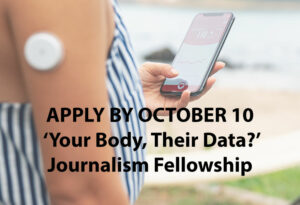 The National Press Foundation is offering a new journalism fellowship: Your Body, Their Data? Reporting on Privacy, Tech and Biometrics.
The National Press Foundation is offering a new journalism fellowship: Your Body, Their Data? Reporting on Privacy, Tech and Biometrics.
This training will equip journalists to cover technical, legal, and policy developments on the new frontier of privacy — and turn them into stories that will resonate with audiences.
The application deadline is October 10, 2022, apply at this link.
From wearables and life-saving medical devices to apps that track location health, fitness, sleep and menstrual periods, consumers’ bodies are being tracked and quantified as never before. And yet, the data is not theirs alone. “Smart” devices that can be attached to our bodies – or implanted or ingested – are coming to market faster than lawmakers can regulate and the public can grasp their implications.
Whether your beat is Silicon Valley or Washington, U.S.-based journalists working in any medium are invited to apply. The fellowship covers hotel, airfare to Washington D.C., and most meals.
Before the pandemic, about 1 in 5 Americans wore a smartwatch or fitness tracker, according to Pew Research Center. That number has only grown since, with market penetration expected to increase by about 6% by 2024, according to Statista. But smartwatches are only a fraction of the devices that monitor the human body and transmit their data as part of the Internet of Bodies (IOB). Products range from pacemakers to insulin pumps, ingestible pills to implantable brain microchips being developed by Elon Musk’s Neuralink and the U.S. military.
Medical devices are regulated by the FDA, and the companies that produce them must comply with HIPAA and cybersecurity guidelines. But who owns patient data is often unclear. Many apps and devices are unregulated, allowing their biometric or behavioral data to be stored, sold, hacked or mined. A host of states have introduced or passed various types of data-protection measures but as of yet, there is no federal data privacy law.
The Supreme Court abortion decision has poured new fuel on the debate. The My Body, My Data Act of 2022 was introduced in the House in June to protect personal reproductive or sexual health information. A month later, the House Committee on Energy and Commerce approved the American Data Privacy and Protection Act (ADPPA) with bipartisan support. This “data minimization” bill, if passed by the full House and Senate, would be one of the most significant internet civil liberty bills in U.S. history, advocates say.
A 2022 poll found that 56% of voters want Congress to pass a data privacy law, while another found that 70% of Americans agree that controlling who can access their digital personal information has become more challenging.
During the fellowship, we will discuss where these stories will go in 2023 and beyond.
Speakers are likely to include federal regulators, scientists, lawyers, doctors, privacy experts, lawmakers or their staff, and those who work in Big Tech or oppose it.
As always, National Press Foundation sessions are on the record and allow ample time for Q&A.
U.S.-based journalists working in any medium (print, TV, radio, digital, podcast) are invited to apply by Oct. 10, 2022. Employed journalists will need a letter of support from their editor. Freelance journalists should submit a letter from a news outlet interested in publishing their work.
For questions, please contact program manager Alyssa Black at ablack@nationalpress.org.
Support for this training comes from Arnold Ventures and Medtronic. NPF is solely responsible for the content.
